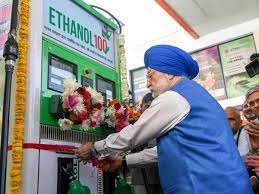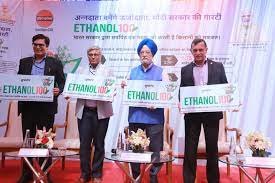Union Minister Hardeep S. Puri Launches Ethanol 100 Fuel Initiative
In a significant move towards sustainable energy, Union Minister Hardeep S. Puri has launched the Ethanol 100 Fuel Initiative. This initiative marks a crucial step in India’s journey towards reducing its dependency on fossil fuels and promoting cleaner alternatives. The introduction of Ethanol 100 fuel is poised to have far-reaching implications across various sectors, including transportation and agriculture.

Why this News is Important
The launch of the Ethanol 100 Fuel Initiative underscores the government’s commitment to promoting alternative fuels and addressing environmental concerns. With increasing global awareness about climate change and the need to reduce carbon emissions, initiatives like these are crucial in aligning India with international sustainability goals.
Ethanol 100 fuel, derived from renewable sources such as sugarcane and corn, offers a greener alternative to traditional fossil fuels. By encouraging the use of ethanol-based fuels, the government aims to reduce the carbon footprint associated with transportation and mitigate the adverse effects of air pollution.
The production of ethanol is closely linked to the agricultural sector, as it primarily involves the processing of agricultural crops. The Ethanol 100 Fuel Initiative is expected to provide a significant boost to the agricultural economy by creating additional demand for crops used in ethanol production, thereby enhancing farmers’ income and livelihoods.
Reducing dependence on imported fossil fuels is a critical aspect of India’s energy security strategy. By promoting domestic ethanol production and usage, the country can achieve greater self-sufficiency in energy resources while simultaneously reducing its reliance on costly imports.
The introduction of Ethanol 100 fuel necessitates the development of compatible infrastructure, including fuel stations and vehicle engines capable of running on ethanol blends. This initiative is likely to drive technological advancements in the automotive sector and spur investment in ethanol production and distribution infrastructure.
Historical Context
India’s pursuit of alternative fuels dates back to the early 2000s when the government introduced the Ethanol Blended Petrol (EBP) program to blend ethanol with petrol. Over the years, various policy measures and incentives have been implemented to promote ethanol production and usage in the country. The launch of the Ethanol 100 Fuel Initiative represents a significant milestone in this journey towards energy sustainability.
5 Key Takeaways from “Ethanol 100 Fuel Initiative”
| Serial Number | Key Takeaway |
|---|---|
| 1. | Government’s emphasis on promoting alternative fuels. |
| 2. | Contribution to reducing carbon emissions and air pollution. |
| 3. | Economic benefits for the agricultural sector. |
| 4. | Enhancing energy security and reducing import dependence. |
| 5. | Need for infrastructure development and technological advancement. |
Important FAQs for Students from this News
Q: What is the Ethanol 100 Fuel Initiative?
A: The Ethanol 100 Fuel Initiative is a government-led initiative aimed at promoting the use of ethanol-based fuel as an alternative to traditional fossil fuels.
Q: How is ethanol produced for use as fuel?
A: Ethanol is primarily produced through the fermentation of sugarcane, corn, or other biomass sources. These crops undergo a process of fermentation and distillation to extract ethanol, which can then be blended with gasoline for use as fuel.
Q: What are the benefits of using ethanol-based fuels?
A: Ethanol-based fuels offer several benefits, including reduced carbon emissions, improved air quality, and support for the agricultural economy by creating additional demand for crops used in ethanol production.
Q: How does the Ethanol 100 Fuel Initiative contribute to energy security?
A: By promoting domestic ethanol production and usage, the initiative aims to reduce India’s dependence on imported fossil fuels, thereby enhancing energy security and reducing the country’s vulnerability to fluctuations in global oil prices.
Q: What challenges are associated with the widespread adoption of ethanol-based fuels?
A: Challenges include the need for infrastructure development to support ethanol distribution and compatibility issues with existing vehicle engines. Additionally, ensuring the sustainable production of ethanol without adversely affecting food security is a key consideration.
Some Important Current Affairs Links

















